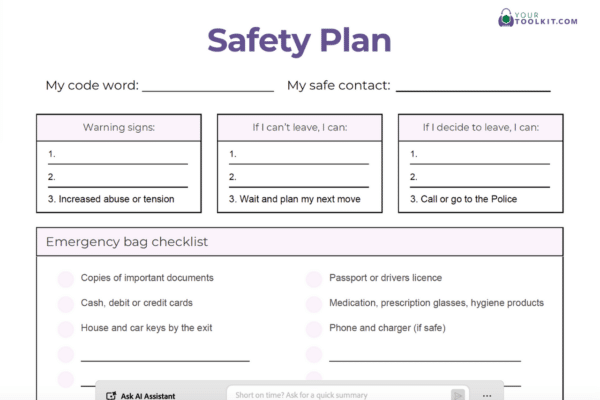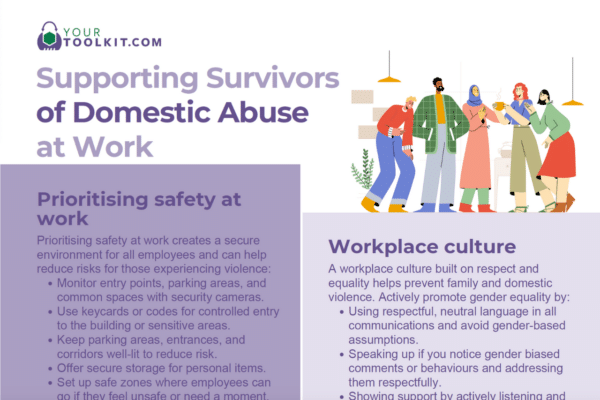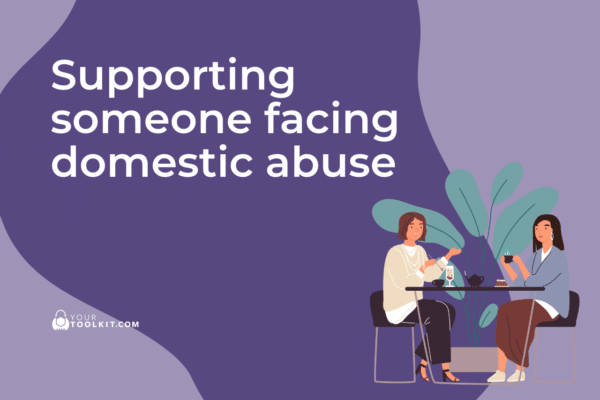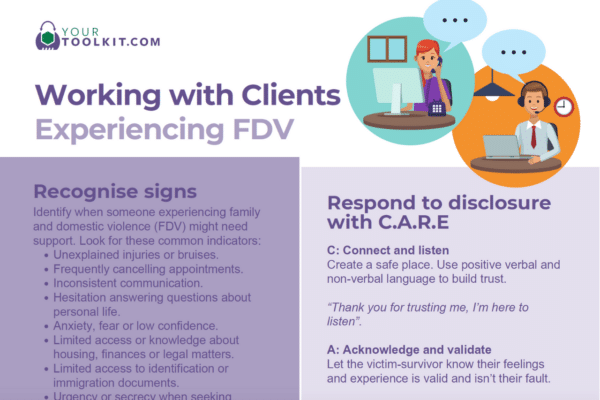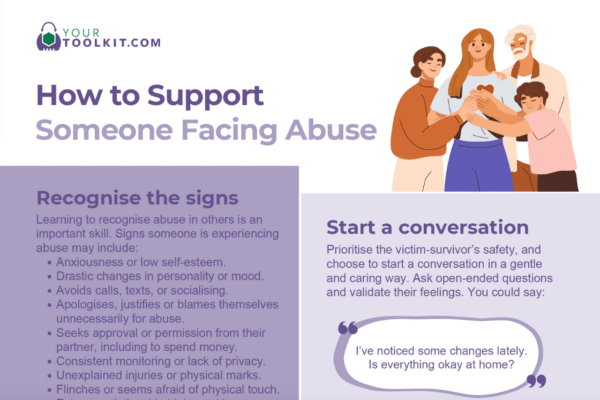Domestic abuse can affect all areas of a person’s life, including their work. As an employer, you are in a unique position to offer support and help create a safe environment for employees who are experiencing domestic violence. This guide provides practical steps and information to help you assist victim survivors in your workplace.
Provide appropriate support
Talking to an employee experiencing domestic abuse
When an employee discloses that they are experiencing domestic violence, it is important to approach the conversation with sensitivity and care:
1. Create a safe environment
- Private setting: Ensure the conversation takes place in a private, quiet setting where the employee feels safe.
- Respect personal space: Be mindful of the employee’s physical space to avoid making them uncomfortable.
2. Listen without judgement
- Active listening: Give your full attention, avoid interrupting, and use affirmations like "I’m here for you" to show support.
- Stay Neutral: Avoid expressing shock or judgement. Focus on what the employee needs.
3. Maintain confidentiality
- Reassure privacy: Make it clear that their privacy will be respected, and discuss who might need to be informed with their consent.
- Limit information sharing: Only share details with those who need to know, always respecting the employee’s wishes.
4. Discuss support options
- Workplace resources: Inform them about available support, such as flexible work arrangements, domestic violence leave, and Employee Assistance Programs (EAPs).
- Tailored support: Offer to develop a personalised support plan based on their needs and provide information on external resources.
5. Follow Up
- Regular check-Ins: Arrange to check in regularly to ensure they feel supported and to adjust the support as needed.
Practical support for victim-survivors at work
A workplace can provide practical support to survivors of domestic violence, which can sometimes provide the opportunity for the survivor to keep their job and independence. Here are practical ways your workplace can offer meaningful support:
1. Flexible work arrangements
- Adjust work hours: Allow flexible hours for court hearings, counselling, or medical appointments.
- Remote work options: Offer the option to work from home or another safe location.
- Role adjustments: Modify job roles or responsibilities to reduce stress or exposure.
2. Safety planning at work
- Personalised safety plans: Develop a safety plan tailored to employees' needs, including secure parking and controlled building access.
- Code words: Establish a discrete system for the employees to signal when they feel unsafe.
- Security escorts: Arrange for escorts to and from the workplace as needed.
3. Employee Assistance Programs (EAPs)
- Counselling services: Promote confidential counselling and support services through your EAP.
- Legal and financial advice: Ensure access to legal and financial counselling for navigating complex situations.
4. Training and awareness
- Educate managers and staff: Provide training on recognising signs of domestic violence and responding appropriately.
- Awareness campaigns: Run regular campaigns to raise awareness about domestic violence and available support, fostering a supportive workplace culture.
5. Peer support networks
- Establish peer groups: Create peer support groups where employees can share experiences and offer mutual support in a safe and confidential environment.
- Encourage open dialogue: Promote an open-door policy, encouraging employees to discuss concerns without fear of judgement or repercussions.
Gender equality and workplace culture
Achieving gender equality in the workplace leads to higher job satisfaction, productivity, and employee engagement. It’s a pivotal step in creating a workplace where all employees feel valued and respected and where the cycle of violence against women can be effectively challenged. Ways to achieve this include:
1. Challenging sexist behaviour
- Zero tolerance policy: Implement and enforce a zero-tolerance policy against sexist behaviour, harassment, or discrimination. Make it clear that such actions are unacceptable and will have serious consequences.
- Regular training: Provide regular training for all employees on recognising and addressing sexist behaviour. This should include bystander intervention training, which empowers employees to speak up when they witness inappropriate behaviour.
2. Breaking down gender stereotypes
- Inclusive language: Promote inclusive language in all workplace communications, from job descriptions to everyday conversations. Avoid language that reinforces gender stereotypes or assumptions.
- Equal opportunities for advancement: Ensure that all employees, regardless of gender, have equal access to career development opportunities, including promotions, leadership roles, and professional training.
3. Creating an inclusive culture
- Diverse leadership: Strive for diversity at all levels of leadership. A diverse leadership team sets the tone for an inclusive workplace culture and ensures that various perspectives are represented in decision-making.
- Employee Resource Groups (ERGs): Support the formation of ERGs that focus on gender equality and inclusivity. These groups can provide a platform for discussing challenges, sharing resources, and advocating for organisational change.
4. Measuring progress
- Regular audits: Conduct audits of workplace policies, practices, and outcomes to identify gender disparities. Use the findings to inform targeted initiatives that promote equality.
- Transparent reporting: Be transparent about the organisation’s progress on gender equality. Share updates with all employees and involve them in the ongoing effort to create a more equitable workplace.
Visit Yourtoolkit.com/saysomething to learn more about how to promote gender equality in the workplace.
Safe workplace policies
Safe workplace policies not only protect employees who may be dealing with domestic violence but also create a safer, more secure environment for everyone. Prioritising these measures demonstrates your commitment to employee well-being and helps foster a culture of safety and support. Here are practical measures to consider:
1. Security measures
- Install security systems: Equip your workplace with security cameras and guards inside and outside the building to deter threats and provide peace of mind.
- Lighting and visibility: Ensure well-lit entrances, exits, and parking areas to enhance security.
2. Secure parking
- Proximity to building: Provide parking spaces close to the building entrance to minimise risk.
- Controlled access: Designate secure parking areas not visible from the main road, limiting the potential for unwanted attention from motorists or pedestrians.
3. Controlled access to office locations
- Swipe cards and access Codes: Use a controlled access system with swipe cards or codes to ensure only authorised personnel can enter.
- Visitor management: Use a visitor management system to track who enters the building and restrict access to sensitive areas.
4. Code words
- Discreet communication: Establish a code word or phrase employees can use to signal for help discreetly, and train staff to respond.
5. Safety plans
- Individualised safety plans: Work with employees to create safety plans, including adjusted entry/exit routes and proximity to security personnel.
- Routine safety drills: Conduct safety drills to ensure everyone knows how to respond to emergencies.
6. Escort services
- Walking escorts: Offer an escort service where employees can be walked to their cars or public transport, particularly if they feel unsafe. Security personnel or trusted colleagues can provide this service.
- After-hours security: Provide additional security measures for employees who work late or arrive early, such as designated secure entry points and security patrols.
7. Emergency preparedness
- Emergency contacts: Ensure that main phone lines have emergency numbers like the police on speed dial. Train staff on how to respond to different emergency scenarios, including situations where an abuser attempts to enter the workplace.
- Crisis response training: Offer crisis response training for managers and HR staff, equipping them with the skills needed to handle emergencies related to domestic violence sensitively and effectively.
Legal and ethical considerations
Employers have a legal and ethical duty to support employees experiencing family and domestic violence. Ensuring compliance with these obligations fosters a safe and supportive workplace. Here’s what you need to know:
- Workplace health and safety (WHS): Employers must ensure a safe working environment under WHS laws, which includes addressing risks associated with domestic violence. Implement safety measures and provide support to fulfil this duty. Visit Safe Work Australia for guidance on WHS obligations.
- Anti-discrimination protections: Under the Fair Work Act 2009 and state-based anti-discrimination laws, employees are protected from discrimination related to domestic violence. This includes unfair treatment, denial of opportunities, or dismissal due to their situation.
- Confidentiality: Maintain the confidentiality of employees who disclose domestic violence. Share information only on a need-to-know basis, with the employee’s consent, in line with Australian privacy laws.
- Reasonable adjustments: Consider making reasonable adjustments, such as modifying work hours, duties, or location, to support the safety and well-being of employees experiencing domestic violence.
- Anti-Bullying protections: The Fair Work Act protects Employees from workplace bullying. This is particularly relevant if the perpetrator is also an employee. Employers should be proactive in preventing bullying and harassment.
- Unfair dismissal: Employees who believe they have been unfairly dismissed due to domestic violence can lodge a claim with the Fair Work Commission within 21 days. Act promptly to address any disputes.
- Reporting obligations: While maintaining confidentiality, employers must be aware of their legal obligations to report certain incidents, especially when there is an immediate threat to the employee’s safety or others in the workplace.
